|
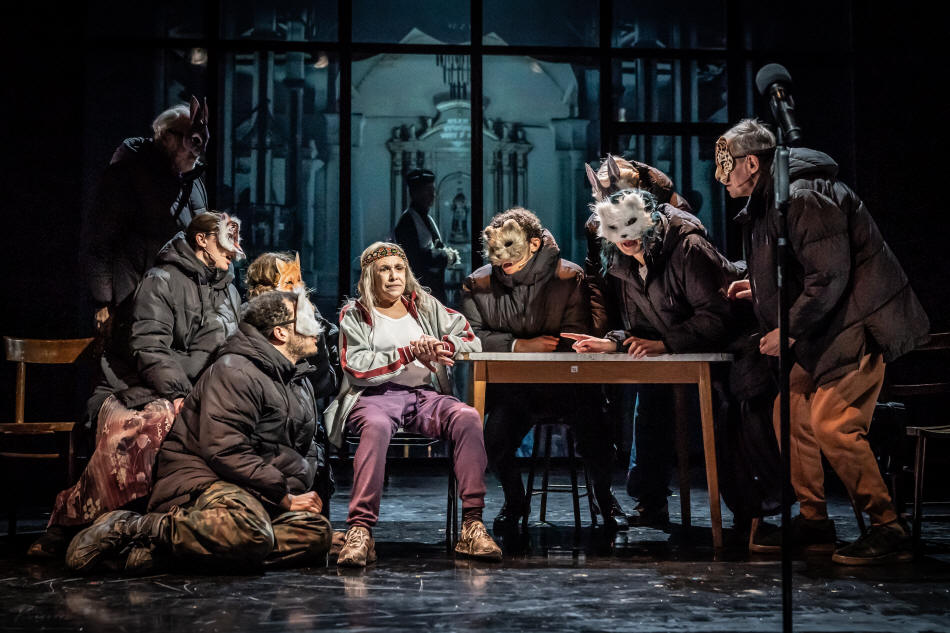
Drive Your Plough
Over the Bones of the Dead
Coventry Belgrade
*****
This is a truly unusual, extraordinary
play. As for intelligible, well…To say (as it does) that it’s a mystery
is indeed most accurate. A riddle wrapped in a mystery inside an enigma
(Winston Churchill, of the Soviet Union).
The Belgrade recommended it for 12 years-plus.
What your average teen would make of it (there were one or two there)
I’m not sure; nor what your average over-60-year-old. Arcane? Cryptic?
Puzzling? Surely not baffling or obscure. Unless…
However this was a meeting of geniuses (genii?).
And it had to be a major event for the Belgrade to be part of. But
vice-versa too. Since Hamish Glen more or less revolutionised the
Belgrade, it has reverted (although it did occasionally hit the jackpot
in preceding decades, notably under the inspiring Ed Thomason) to the
hugely important venue it was in the 1950s when Tito’s Yugoslavs sent
over the timber for the original building. It’s joined the must-go-to
venues (Manchester Royal Exchange, Leeds (West Yorkshire) Playhouse,
Bristol Old Vic) for any touring company of significance.
Complicité (it was founded and achieved fame
originally as Théâtre de Complicité) is most certainly a company of
MASSIVE significance. And as so often with pairings on such occasions
(Prospect Theatre co. - Ian McKellen and Derek Jacobi, Renaissance
Theatre co. - Kenneth Branagh and David Parfitt), Complicité brought
together the mind-bogglingly brilliant duo of Simon McBurney and actress
Kathryn Hunter (just topped 66, can you believe it? She’s as spry as one
of those 12 year olds).
And they’re still at it.
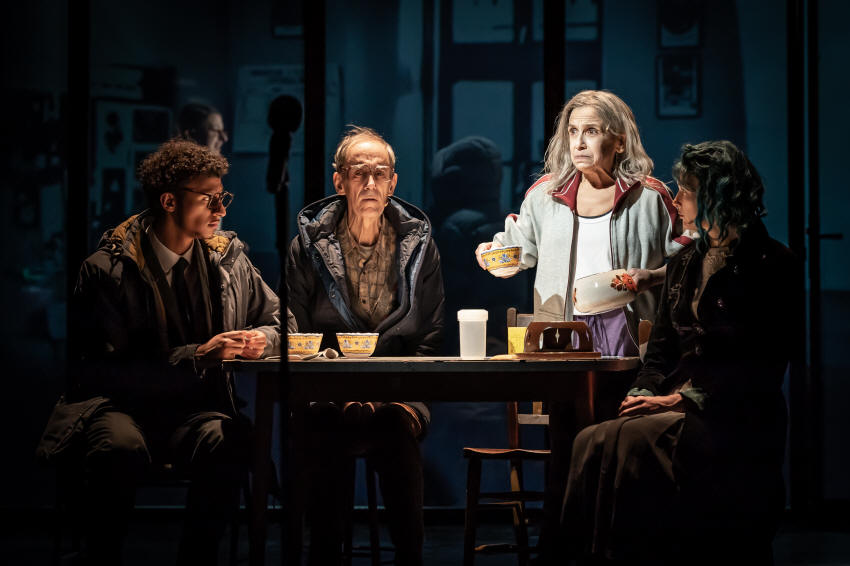
I was immensely lucky. Complicité (co-founded by
McBurney in 1983) mounted half a dozen fledgling presentations before I
was knocked sideways by his staging of Swiss playwright Friedrich
Dürrenmatt’s Nazi-hunting play The Visit (‘Der Besuch der alten Dame’,
written in 1956), which he brought to Stratford, and which did as much
as anything to put the Company’s name right in the forefront. Since
then, it has never looked back.
Could anything match Hunter’s haunting part in
that? Propped by two sticks, ancient, grim, scheming, a black raven,
bent on vengeance, she sent shivers down your spine – and those of a
whole township – as she gradually, systematically, exposes the town’s
mayor for his Hitler-era crimes. As so often with Complicité, it was a
brilliant choice of play: large cast, ingenious differentiation of
character types: a veritable masterpiece, and a stupendously haunting
production to boot.
But yes, Hunter has matched it since. Her
Richard III was legendary (much as Anthony Sher’s – there were
parallels - was at the RSC). She stormed the stage as the moodiest,
bossiest then most poignant King Lear at Shakespeare’s Globe a
season ago (a role she originally played there 25 years ago). She was
all three Witches in the Coens’ film The Tragedy of Macbeth.
Having played the Fool – shatteringly, of course - in the RSC’s Lear,
she was back at Stratford most recently in the title role of Timon
of Athens; And seasons earlier, she directed their Othello,
which was luckily seen at Warwick Arts Centre.
‘Physical Theatre’ is one of the phrases commonly
associated with, possibly attributed to, her. Her moves usually speak
mountains, hence her Shakespeare is awe-inspiring, eye-battering,
gut-wrenching, unmissable.
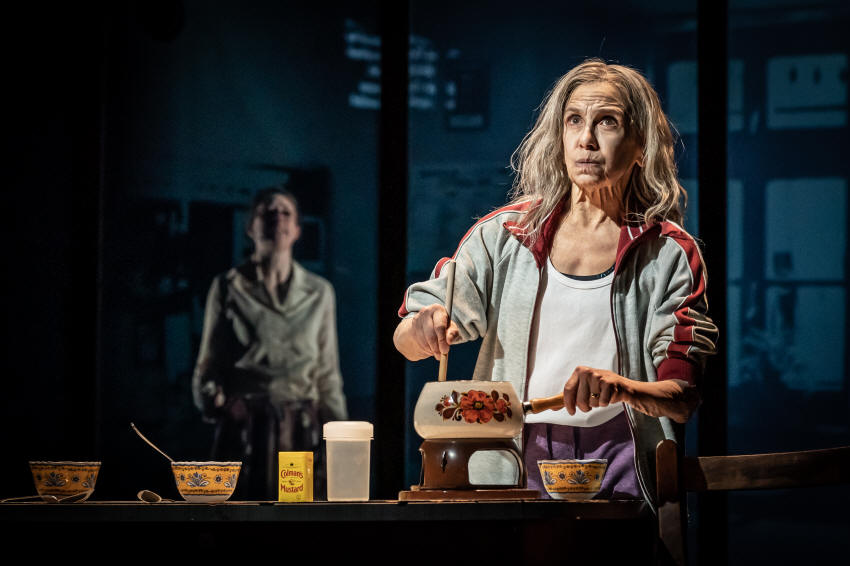
In the Daily Telegraph Charles
Spencer caught her well: ‘diminutive in stature, moving slightly lamely,
she has a deep, guttural voice, eyes like black olives and the most
expressive of faces. Almost nothing seems beyond her range, from
farcical clowning to deepest, darkest tragedy.’ Michael Billington in
The Guardian agreed: ‘An astonishing performer: she can play
just about anything’.
Perhaps it was that – this brilliant versatility
of hers - which for me hoicked this staging down from the full five
stars so many have allocated it. It’s her moves, stances, gestures, not
just her vocals, that are the essential Hunter. In Bones she is a kind
of strange, arresting, controlling Narrator. All her essential lines are
delivered virtually from a podium.
Lecterns don’t move much. All that magical ‘shape
shifting’ (Billington again) was sliced away. Those never-ending,
constantly shifting, audience-mangling shapes she can create – the
grotesque, the hobbit, the animalic, the crook-backed, the wizened; and
those moves - the lop-sided, the faltering, the awkward, the limping,
the ankle-twisting, the precariously poised - seemed shorn away. It did
not play to Hunter’s strengths; or McBurney’s, for that matter: for he,
too, can create the slinky, the monster, the shivering, the indifferent
(take those spiky fingers of his toast-buttering Lacon in Gary Oldman’s
Tinker Tailor Soldier, Spy); or the superbly manufactured
evilness of his Angelo in Measure for Measure (RNT).
He and Hunter were doomed for each other. She,
born in April, 1957. He in August that same year. Were the stars somehow
conjoined? It was the Chinese year of ‘the Rooster’. What personality
did a fire Rooster denote that year? “Free-spirited and intelligent (and
fiery); can yield outstanding leaders. Fiercely competitive, and loving
a challenge, they have particularly strong emotions: all this is why
they're invariably in the spotlight.” Well… Yes.
Based on Nobel Prize winning author Olga
Tokarczuk’s 2009 novel of the same name - vividly translated
by Antonia Lloyd-Jones from the Polish: (word for word: Prowadź swój
pług przez kości umarłych) – the play has been dubbed ‘darkly
comic, anarchic, noir’, and caused ‘a seismic reaction’ in Tokarczuk’s
native Poland, ‘due to its defiant attack on authoritarian structures,
with right-wing press branding the writer an “eco-terrorist” and
“national traitor”.’
The folk-tale begins in the depths of winter in a
small community on a remote Polish mountainside, where southern Silesia
abuts the modern Czech Republic (there are frequent references to the
latter).
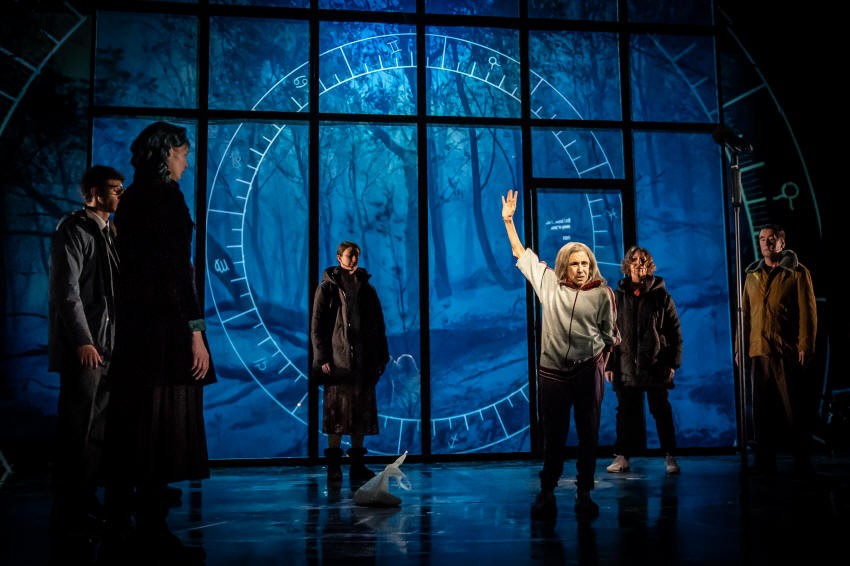
Men from the local hunting club are dying in
mysterious circumstances; and Janina Duszejko [Doosayko] – an eccentric
older local woman, environmentalist, devoted astrologer (Hunter, and the
script, make much of this, for there comes with it more than a hint of
the anarchistic), plus passionate translator of - and identifier with -
William Blake (the very first words are Blake’s, and his vision of a
better, cleansed, kinder, earth, his ‘new Jerusalem’, surfaces, figures
and indeed prevails throughout) – propounds her bleak (though in fact
deceptive, compromised) suspicions. What’s going on?
Where does all this dump us? As some claim, in
“an extraordinary world that speaks to one’s deepest sense of the
continuity between humankind and nature – a world where, like a mycelium
(fungus – so infectious?) web, all entities are connected deeply at the
roots, unable to exist alone.” “A tale about the cosmos, poetry, and the
limitations and possibilities of activism.”
That does sound like a bit of a collage. And the
alternation between the Speaker/Narrator/Commentator/Stirrer-up (Hunter)
and the mainly silent, shadowy, kind of Greek chorus (animals, humans,
things) behind her constantly sets up a kind of duality (though she
occasionally intermingles with them) that makes it seem like a steam
train-and-carriages: to-and-fro, back-and-forth. Bitty.
To acknowledge this very International cast, they
were Thomas Arnold, Johannes Flaschberger, Amanda Hadingue (who covers
the lead and actually stood in for Hunter at the Thursday afternoon
Belgrade performance), Kiren Kebaili-Dwyer, Weronika Maria, Tim
McMullan, César Sarachu, Sophie Steer and Alexander Uzoka.
They are a constant presence, and their acting is
of course fine. But not strong, because they are shrouded, deliberately.
We feel them as one whole, perhaps a dominant, rebellious majority. But
they do emerge as individuals (usually victims), too, and each also has
a soliloquy, or a speech addressed to the central being - and all were
so well taken that one rather wished there had been a lot more.
Janina’s ‘deep concern for the welfare of
animals‘ – her ‘identification with the animal and natural world’
provides one key channel for her revolutionary take on our selfish, over
accepting, unconsciously or consciously brutal human race’s numerous
injustices – a hybrid attack: too hybrid? A bit of an ant-hill? A bin
bag of goodies just a mite too frenetic?
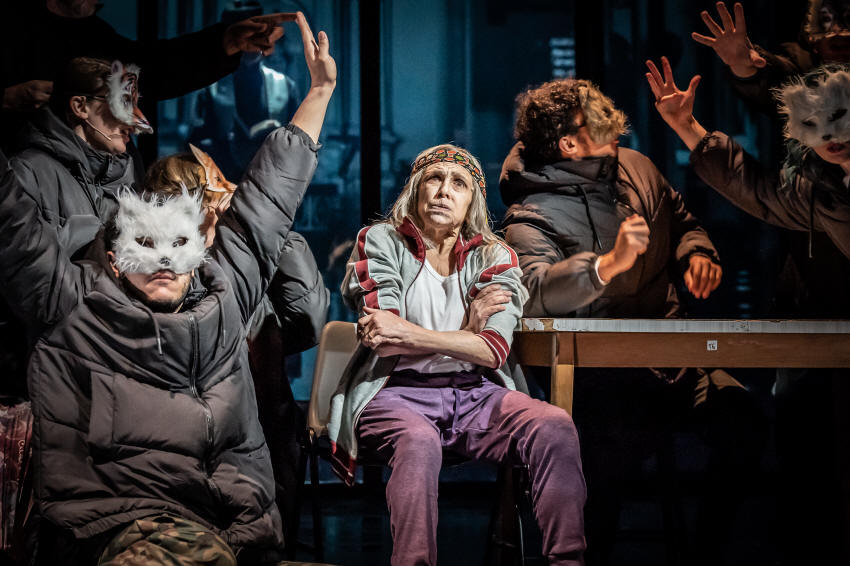
The paradox within the piece (play and novel)
emerges at the close, where she reveals that the assaults and killings
she describes were in fact murders committed by herself. Having
empathised with this endearing bird-like figure (another old lady for
Hunter; and there are strong creepy, manipulative similarities between
her here and in The Visit), we are (it is hoped) deeply shocked to find
out the truth and the irony and crude malice the end unveils. Well, we
were and we weren’t.
Tokarczuk’s massively acclaimed novel – Agnieszka
Holland filmed it under a different title in 2017, it was nominated for
a Man-Booker Prize (she has won one before) and she was awarded the
Nobel Prize for Literature in 2018, in fact immediately after its
publication - is certainly a philosophical treatise. A kind of
Foucault-like exposé of and assault upon numerous deep-felt or bland
everyday assumptions.
Hence in the play, “engaged in fierce resistance
against the injustices around her, Janina refuses to be a prisoner of
society, or of gender. Her actions ask questions both of the male world
which surrounds her and of our deeper human intentions: what does it
mean to be human, what does it mean to be animal, and can we separate
the two? Why is slaying animals sport, and killing humans, murder?” One
character accuses her of caring more about animals than humans. And it
seems so.
McBurney’s typically far-reaching aspiration, and
the miraculous intensity and burning ambition (and wonderful hubris)
which has driven him and Complicité to plough furrows so fabulous over
four decades, is for a piece of immersive theatre (is theatre ever
non-immersive?) so awesome that it will open doors, gates, portals,
portcullises, to something almighty important: in very truth, “A ticket
to another world.”
DYPOTBOTD (the novel and play’s enigmatic title
does indeed come from Blake’s The Marriage of Heaven and Hell (Proverbs
of Hell, 1790-93): “In seed time learn, in harvest teach, in winter
enjoy. / Drive your cart and your plow over the bones of the dead.”)
centres on the assertions and indignations, postulations and finger-pointings,
interactions - and imaginings – of Hunter’s actually not so dreadfully
ancient Polska dama.
Amid the priests, beetle-hunters, political
magnates – all bumped off - what did catch one’s imagination at the
Belgrade were the (superbly managed by the controls technician) Lighting
- Paule Constable, celebrated for illuminating operas not least; and the
subtle Musical score (Richard Skelton, projected by Sound Designer
Christopher Shutt alongside eye-tingling Video Designer Dick Straker).
These were all added to the sizzling cauldron of
the script. “A riot of quirkiness and eccentricity, shifting from droll
humor to melancholy to gentle vulnerability, a kind of mercurial prose
quite unclassifiable."
”Both a suspenseful murder mystery and a powerful and profound
meditation on human existence.”
A wonderful medley, in other words. Or a
miraculous hodge-podge.
Roderic Dunnett
21-04-23
|

